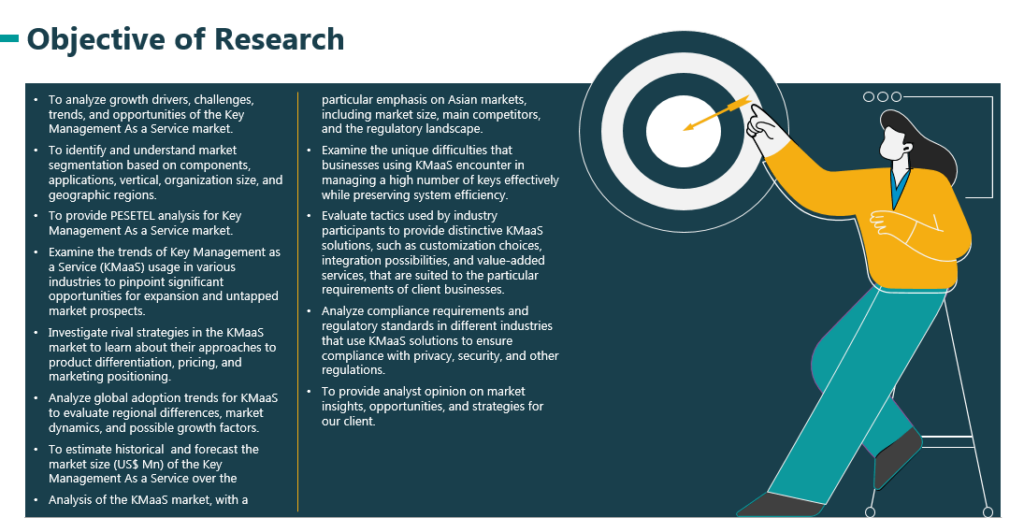
Client Requirement
Our Client, who provides Key Management As a Service, was looking to analyze the adoption trends of KMaaS among different industries. The client also wanted to understand key stratagems adopted by their competitors in order to compete in the market.
- The client wanted to analyze trends in the global market. They wanted to understand the adoption rate among various industries.
- The client wanted to analyze the global overview of the Key Management As a Service market and its analysis in Asian markets.
- The client aims to solve the specific issues faced by firms that use KMaaS to create systems that handle large volumes of keys efficiently while maintaining a high level of performance.
- They also wanted to analyze the strategies adopted by the players in the market for providing unique solutions to the companies requiring KMaaS solutions. They also wanted to understand the regulatory standards to be maintained in various industries .

How the Market was Approached?
Through extensive data mining, Credence Research collected and analyzed all the available references , including news articles, press releases, scientific journals, and technical white papers, on the KMaaS industry.
Identifying drivers such as increased concerns about cyberattacks and breaches of data are driving the demand for sophisticated key management solutions. The trend includes increasingly opting for hybrid key management options. Challenges Concerns about the security of storing encryption keys in external cloud settings. Opportunities arise from expanding their footprint in emerging economies where cloud usage is growing.
Understanding market segmentation based on components such as Solutions and Services. Applications include Disk Encryption, File Encryption, Database Encryption, Communication Encryption, and Cloud Encryption. By Vertical segmented into BFSI, Healthcare, IT and Telecommunication, Government, Retail, Manufacturing, Aerospace and Defense, and Others .
Focus on Analyzing the Market trends, especially the Asian region.
For value chain analysis, Credence Research emphasized Key components include technology companies producing encryption solutions, KMaaS vendors providing key management platforms, managed service providers providing implementation and support, and end users using secure key management for data protection and regulatory compliance.
Forecasting the market size (US$ Mn) of Key Management As a Service over the forecast period requires employing statistical models, trend analysis, and industry insights. Factors such as technological advancements, market trends, and economic.
The global Key Management As a Service market was valued at USD 705.2 Mn in 2021 and is projected to reach USD 3598.2 Mn by 2027 at a CAGR of 30.7% during the forecast period.
A detailed analysis of all the trends and developments was carried out to understand the available technologies and determine the future of Key Management As a Service.
Assess challenges and solutions for the Asia Key Management As a Service Market:
In the Asia Key Management as a Service (KMaaS) market, providers face a number of problems, including a lack of understanding among organizations about the necessity of strong key management procedures, which results in restricted demand.
Furthermore, the regulatory complications and various data protection legislation across Asian countries present hurdles for KMaaS providers in assuring compliance with varying standards.
Additionally, competition from domestic competitors and cultural variations in business processes might make market penetration difficult for multinational KMaaS suppliers.
To address these issues, providers might use education and awareness initiatives to emphasize the need of data security and compliance. Creating customized solutions that address distinct regulatory needs in various Asian markets can also boost competitiveness. Building strategic collaborations with local businesses and leveraging their market experience can help overcome cultural and competitive hurdles, resulting in smoother market entry and expansion.
Investing in strong customer service and training programs can help clients develop trust and loyalty, enhancing KMaaS providers’ position in the Asia market.
Adoption trends of KMaaS among different industries:
The adoption of Key Management as a Service (KMaaS) varies by industry, reflecting the varying demands and priorities of companies. In industries such as finance and healthcare, where data security and regulatory compliance are critical, KMaaS solutions are widely adopted. These businesses handle sensitive information and must adhere to strict data protection regulations, which drives the demand for strong key management services.
Similarly, businesses experiencing fast digital transformation, such as retail and manufacturing, are increasingly relying on KMaaS to protect digital assets and streamline encryption key management operations. Furthermore, industries with complicated supply chains and vast partner networks, such as logistics and telecommunications, use KMaaS to provide safe data sharing and communication among many parties.
However, some companies, notably smaller organizations in less regulated sectors, may experience slower adoption rates due to budget restrictions, a lack of understanding of cybersecurity threats, or dependence on traditional key management techniques.
Adoption of new KMaaS technologies among companies that generate large volume of data to surge the demand of KMaaS globally
Constructing scalable infrastructure with distributed key management capabilities can help effectively manage huge volumes of keys while ensuring high performance in KMaaS systems. Secure and effective key management activities can be achieved by utilizing cutting-edge encryption algorithms and optimized key storage systems, such as hardware security modules (HSMs) or key vaults.
Maintaining compliance with industry rules and data protection legislation requires a number of critical approaches to managing regulatory standards for Key Management as a Service (KMaaS). KMaaS providers must thoroughly evaluate the regulatory requirements relevant to their target markets and client sectors. This entails keeping abreast of changing laws like the GDPR, HIPAA, and PCI DSS and comprehending how they affect important management procedures.
Furthermore, in order to comply with legal requirements for data protection, strong security measures and encryption methods must be implemented. To protect client data from unwanted access and breaches, KMaaS providers should abide by industry best practices for key management, encryption key lifecycle management, and access control.
In addition, it is imperative to maintain open lines of contact with clients regarding regulatory compliance methods. It is recommended that KMaaS providers furnish unambiguous documentation, reports, and audit trails in order to exhibit conformity with regulatory standards and support customer compliance initiatives.
Ongoing monitoring and compliance audits are required to verify regulatory compliance and identify any gaps or opportunities for improvement. Working together with legal and compliance specialists can also offer helpful direction and assistance in negotiating intricate regulatory environments and upholding adherence to relevant standards.
